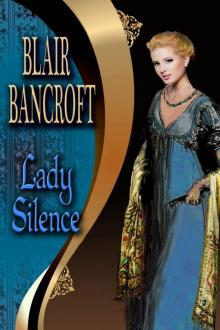- Home
- Blair Bancroft
A Gamble on Love Page 2
A Gamble on Love Read online
Page 2
“Lieutenant Fortescue followed General Wellesley off to war without a backward glance,” Aurelia told her companion. “And if he had looked back, it certainly would not have been at me. We have partnered each other at assemblies, nothing more. And at the rate the war is going, I will have reached my twenty-fifth birthday before he ever comes home.”
“Yes, dear, but I do believe mention of his name has captured your attention,” Miss Aldershot declared with bland innocence.
“Gussie!”
“In the natural course of things,” Miss Aldershot continued inexorably on, “you would be granted a decent period of mourning. But this is not the case. The wolves are gathering—mark my words, your cousin Twyford will find a way to have you, no matter what nastiness it takes.” Gussie allowed this statement to hang in the air between them, like some poisonous cloud.
Face forlorn, Miss Trevor laid her book onto the small round table beside her chair. “You know I do not wish to marry at all unless I can find someone who will let me manage Pevensey as I choose. Papa raised me for it, Gussie. Trained me. Unlike other girls who must leave home when they marry, Pevensey is mine, all mine. I will not hand it over to some man who plans to do with it as he pleases.”
“Nonetheless, young Harry has shown us the way. You must marry the moment you reach your majority. We are already into September, so the second of November is not that far off, my dear. We must embark upon a search immediately.”
“Immediately? You cannot think that Twyford would . . . would—”
“Ravish you? Indeed, I do. Since the beginning of time men have done such things to gain land. It is simply accomplished more discreetly in this day and age.”
Silence reigned. A cozy fire crackled in the fireplace, sparks drifting down from the raised grate. “We must face the truth, Relia,” Gussie said at last. “No matter you are still in your blacks, we must go husband-hunting. Except for Stanton and Fortescue, this area has always been sparse of suitable young men. Nor can you go to the local assemblies or up to London for the fall season without encountering grave censure—”
“Nor would I care to!” Aurelia interjected. “For I am in mourning, Gussie. I miss papa and mama quite dreadfully.”
“As do I, child,” Miss Aldershot murmured. “But we cannot let our grief overwhelm us. We must act. I believe . . . yes, I will write to two or three friends, asking their assistance.”
“I do not want them to think I am begging!” Aurelia protested.
“No, no, child. I will merely indicate there is a reason why you must marry so soon after your papa’s death. Heiresses in distress are too common for anyone to doubt the truth of it.”
As the ladies stared at each other, eyes wide with anxiety compounded by resignation to the inevitable, Biddeford entered, bringing the evening tea tray. By the time Aurelia had poured out, she was becoming slightly more reconciled to the awful necessity of marriage. A young woman of no little intelligence, she had not failed to recognize the import of Harry Stanton’s visit. Even her closest friends and neighbors considered her fair game.
“I will write to my godmother,” Aurelia conceded. “Lady Morville is well situated in town, a pillar of the ton. Surely she will know of someone.”
“An admirable plan,” Miss Aldershot approved. “If we can but stave off the twiddlepoop’s advances until we find a savior.” Even as Gussie said the words, horrid possibilities filled her mind. “You must not ride out alone any more, child. And tell Biddeford to check the locks on every door each night without fail.”
“Truly, Gussie, I cannot believe Twyford would go to such an extreme.”
“Twyford is worse than a beast, Aurelia. He is a sly beast. He will do as he pleases, leaving his parents none the wiser. And if they should suspect, after the fact it will not matter. You will have no choice.”
After the fact. In spite of the warmth of the fireplace, Aurelia shuddered.
~ * ~
Chapter Two
The next morning found the ladies frowning over their letters, quills in hand, appropriate words refusing to separate themselves from the jumble in their minds. Was there any subtle, pride-assuaging way to state that an heiress in mourning was in immediate need of a husband? And, even if it were possible for the young lady to swallow her pride, how did one go about stating her preferences? For, of course, not just anyone would do.
“My dear,” Gussie declared as she looked up to discover Aurelia nibbling the feathered end of her quill, “I fear we have not thought this problem through. What are your requirements for a husband?”
Requirements. Aurelia jabbed her quill back into its stand, clasped her hands tightly in her lap, and glared at the offending piece of blank parchment lying on her marquetry escritoire. She supposed that sometime in the not-so-distant past—when she sat, creating air castles on the white marble bench in the rotunda—she had indulged in girlish dreams of love and happily ever after. But her knight errant, her pirate captain, her prince, had all remained faceless. Nothing more than a glow in her heart, a naive promise that someday she, like the heroines in novels, would find the one great love of her life. They would live together, raise children together . . . and never, ever, leave Pevensey Park, as long as they both should live.
In a voice so cold and uncompromising Aurelia surprised even herself, she pronounced, “He must be willing to let me live at Pevensey Park.”
Miss Aldershot, taking a fresh sheet of paper, dutifully recorded: Must have no estate of his own.
“He must have enough money that I know he is not marrying me solely for my wealth.”
“Aurelia dear, almost all marriages in the ton are made for reasons of acquisition. Land, dowries, prestige—it is the way of the world. You cannot expect—”
“Write it down.”
Must have respectable fortune was added to the list. “Do you not care about his age, dear? His looks?” Gussie inquired.
“Naturally, I would prefer a man not more than ten years older than myself,” Relia responded with what sounded suspiciously like bitter resignation, “and one pleasing to the eye. But I am not a fool, Gussie. I will not sacrifice Pevensey Park to a pretty face. My first two requirements are the important ones.”
Miss Aldershot did not add age or physical characteristics to the list. “Anything else?” she asked.
Aurelia toyed with her quill, rearranged the inkstand, heaved a sigh that was closer to a groan. Her chin went up. “I want a husband who will support my authority, but not usurp it. One who has other interests and will allow me to control Pevensey, as I was brought up to do.”
“Oh, my dear,” Gussie breathed, “I do not believe I can put that in a letter. My friends would think you quite mad. And not a man in England would agree to such a condition.”
Aurelia hung her head. “I know. But record it, if you will. Until this moment, I had not fully recognized how much it matters to me. If you write it down, no matter what compromises I must make, I will at least have a record of how I felt before this horrid business of husband-hunting began.”
“Relia . . . almost every female in the land must leave the home of her birth, cling to her husband—”
“Whither thou goest,” Miss Trevor quoted with considerable scorn.
“Indeed.”
The room darkened as the sun was obscured by a cloud. Presently, Aurelia picked up her quill. With her thoughts coalesced at last, she began her letter to Lady Morville.
Miss Augustina Aldershot, ignoring her misgivings, followed her employer’s lead. Having once, if briefly, known love, she had hoped that Relia, like her parents, would find a true and lasting love. Evidently, it was not to be. In the careful penmanship Miss Aldershot had imparted to Aurelia when she was her governess, she wrote the promised letters to her friends, informing them that Miss Aurelia Trevor was in search of a husband, landless but not impoverished.
Gussie’s letters bore first fruit. Just over a fortnight later a post chaise drew up to the front portico of Peve
nsey Park, disgorging a tall man of uncertain age. As Aurelia heard Biddeford striding across the tiles toward the front door, she scampered away from the window, where she had been peeking at their guest, and plumped herself down upon a gold and cream striped satin settee, whose scrolled fruitwood arms gleamed with beeswax polish.
In a few moments Mr. Oswald Pitney was bowing before her. He was so tall and thin, so solemn, she almost expected him to creak as he straightened up, rather like the bending of a giant pine or perhaps one of the marble statues in the park. But he was not unpleasant in appearance, Relia noted with relief, for, in spite of her grand words, she would have to look at him for the rest of her life. He was just a bit . . . well, craggy—rather like a mountainside she had once seen when the family visited Wales.
After her guest was perched, somewhat awkwardly, on the edge of a chair that matched the settee, Miss Trevor said, “I understand you are an academic, Mr. Pitney?” She had been hopeful for exactly this reason, as her papa, though a conscientious landowner, had spent the better part of each day in his library, surrounded by his beloved books.
Mr. Pitney stretched his long neck, as if his cravat were interfering with his thought processes, then declared, “Indeed, Miss Trevor, I have been quite content in my quiet residence in Oxford. Happy with access to the many treasures there. But when I heard Pevensey . . . that is, when I was informed there was a lady in distress—one to whom I might give assistance—I felt it my duty to meet with you.”
“I see.” Aurelia seized upon the faint hope in these words. “Then you find your studies, your quiet life, fulfilling? Worthy of absorbing all your time?”
“I do indeed,” Mr. Pitney responded with the first sign of animation she had seen from him.
Excellent. Kent was some distance from Oxford. Mr. Pitney might spend considerable time away from Pevensey Park.
“My father is a baron,” her guest offered with cool pride, “able to provide me with a comfortable independence. I was intended for the church, but found my calling is to books and not the cloth. Although I have never been in the petticoat line, I am not so unworldly as to eschew an advantageous marriage when coupled with the impelling call to provide guidance to a female left rudderless in this harsh world.”
Rudderless indeed! Miss Trevor determined on the instant to eschew Mr. Oswald Pitney. If at all possible. In a few short minutes she thanked the solemn Mr. Pitney for journeying all the way from Oxford into Kent. She was considering several suitors, she told him, and would inform him if he would be required to uproot himself from the hallowed halls of academia. Though obviously shocked by a gentle maiden demonstrating calm control of such a delicate situation, Mr. Pitney made a stiff farewell and took himself off.
As the front door shut behind him, the Pevensey ladies looked at each other and rolled their eyes.
“He is, nonetheless, a possibility,” Aurelia sighed. “I doubt he would be much bother.”
“My dear child,” Miss Aldershot sputtered, “I doubt you’d ever get a child out of him!”
“Gussie!”
“Aurelia, there are certain things we have never discussed. I will say only that when a rake is over thirty and unmarried, no one questions his virility. But that man was thirty-five, if he was a day, and not a sign of an interest in anything but books.”
“He was panting over my acres, you know quite well he was.”
“Undoubtedly—what else could you expect? But,” Gussie added ominously, “if there is one thing I know you want besides Pevensey itself, it is an heir, someone who will love and care for the Park as you do. And I tell you, that man won’t do.”
The ladies waited, but, alas, Miss Aldershot’s three letters produced only Mr. Oswald Pitney. Their last hope was Lady Morville, who finally communicated her triumph in a letter recommending a Darrell Carswell, Viscount Hanley. She would send him down to Pevensey Park directly.
And now—a scant three weeks before she might wed without her guardian’s consent and with little time left for vital repairs before winter set in—Lord Hanley was here. Aurelia’s knees threatened to fail her as she walked through a succession of finely decorated rooms on her way to the drawing room. Twyford. Harry. Mr. Pitney. And now Lord Hanley. Surely, it was time for fortune to smile on her.
Relia paused at a pier glass in the small Red Ante-Chamber just outside the drawing room. What would Lord Hanley see? She smoothed the fall of her silver gray silk gown, its hem banded in narrow strips of black lace. The raven curls tumbling artfully over her ears had not been disarranged by any mischievous gust on the terraces. The rest of her hair was piled high on her head and fastened with mother-of-pearl combs. The face staring back at her was round, young and surprisingly sweet, giving little hint of the stubborn and aristocratic nature beneath. Except for her eyes, which were a surprisingly intense blue. Swiftly, Relia lowered them, as she noted their sharp, penetrating stare was not completely disguised by her long thick fringe of lashes. Gentlemen did not care for intelligent women. Controlling women, they despised.
Nor was she was in her best looks. Mourning, even gray, did not become her. And the strain of her husband-hunt was showing. Her eyes seemed more deep-set than usual, and there were smudges—more truthfully, visible half-circles—beneath them. Yet, surely, a woman, even six months into mourning, might not be expected to look as dewy fresh as a schoolroom miss.
Lord Hanley was waiting.
Aurelia took a deep breath, ordered her lips into a smile, and entered the drawing room.
Oh, my! Darrell Carswell, Viscount Hanley was positively beautiful. Dressed in perfect town attire of finely fitted blue tail coat, striped vest, fawn trousers, and mirror-polished Hessians, Lord Hanley showed his gleaming white teeth in a charming smile and took her hand, feathering a kiss just above her knuckles. The devil! Kissing a lady’s hand was a greeting from her parent’s generation. But was there a lady of any age whose heart did not flutter, at least a trifle, over such an intimate gesture?
His pockets are sadly to let, Lady Morville had written, but his prospects from a favorite aunt are excellent, so I do not consider him in true need of an heiress. Although, she had added judiciously, the boy would be a fool to ignore such a splendid opportunity as Pevensey Park.
“The boy” was, Aurelia judged, not more than five or six and twenty, but he exuded what was known as town bronze from every square inch. In fact, in spite of his charming façade and apparent good nature, she felt herself diminishing from Lady of the Manor to Country Mouse. Control. She must seize control.
“You enjoy life in London, Lord Hanley?”
His blue eyes lit with what Miss Aldershot would later describe as a fanatical gleam. “I guarantee you will love London, Miss Trevor. It is the only place to be, don’t y’know? All that’s important happens in town.”
Relia’s heart plummeted, but perhaps things wouldn’t be so bad if Lord Hanley preferred to stay in town and was willing to leave her in the country—a common arrangement, she knew. “You do not care for the country then?” she asked.
“The country?” Viscount Hanley made a brave effort. “An occasional weekend is acceptable,” he allowed. “A bit of shooting, a hunt now and again.”
“Am I to understand you prefer to live in London year-round?”
“Is there anything else?” he asked with an arch look ameliorated by an insouciant smile. “Just think, Miss Trevor,” he continued, positively quivering with eagerness, “if we are wed, we can furnish a townhouse with nothing but the best, give the finest parties, become leaders of the ton—”
“I—I fear I have no interest in London, Lord Hanley,” said Aurelia, clinging desperately to a mask of calm, even as she felt her last hope being wrenched asunder.
“Dear girl,” he cried, “you cannot expect me to live in the country? Why . . . good God, it smells!”
Pevensey Park. Which smelled of fresh-scythed grass and flowers. Of waving stands of wheat and ripening fruit. Of hops and oast houses. Of sheep and cows
and pigs. New-turned earth. Spring rains and summer lightning. Of fish in the stream and the sweat of dedicated labor. Of life—birth, death, renewal.
Here she was and here she would stay. Somehow she would find a way.
Though Viscount Hanley’s failure to live up to expectations was a bitter blow to the ladies of Pevensey Park, the very next morning Miss Trevor, ever resilient, ordered up her carriage and journeyed into Tunbridge Wells. There, she consulted Mr. Josiah Eastbridge, a rival solicitor to the man who had served her father for so many years and who now, apparently, served only her Uncle Hubert. Mr. Eastbridge, a gentle soul, could scarce believe he was to be entrusted with any modicum of the Trevor family business—however secretive Miss Aurelia might be about her true purpose. He was, therefore, only too happy to recommend a solicitor in London. His old schoolmate, Sir Gilbert Bromley, a man of rare perspicacity, sometimes know—he informed her proudly—as the Solicitors’ Solicitor.
Miss Trevor, pleased with both Mr. Eastbridge and her own daring, gave her maid and Gussie Aldershot only minimal time to pack before the three women set off for London. After securing a fine suite of rooms at Grillon’s—for which Relia gave thanks that her papa’s will included a generous pin money allowance—a letter of introduction was despatched to the much-vaunted Sir Gilbert Bromley. The solicitor responded with flattering prompness.

 Sorcerer's Bride (Blue Moon Rising Book 2)
Sorcerer's Bride (Blue Moon Rising Book 2) Orange Blossoms & Mayhem (Fantascapes)
Orange Blossoms & Mayhem (Fantascapes) Royal Rebellion
Royal Rebellion The Sometime Bride
The Sometime Bride A Season for Love
A Season for Love Death by Marriage
Death by Marriage Tarleton's Wife
Tarleton's Wife Limbo Man
Limbo Man Airborne - The Hanover Restoration
Airborne - The Hanover Restoration The Harem Bride
The Harem Bride Lady Silence
Lady Silence Shadowed Paradise
Shadowed Paradise The Last Surprise
The Last Surprise Paradise Burning
Paradise Burning Florida Knight
Florida Knight A Gamble on Love
A Gamble on Love The Bastard Prince (Blue Moon Rising Book 3)
The Bastard Prince (Blue Moon Rising Book 3)